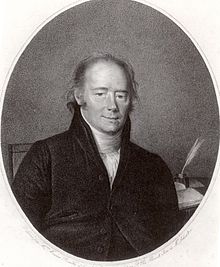William Allen (Quaker)
William Allen (born August 29, 1770 in Spitalfields , London , † September 30, 1843 in Stoke Newington, London) was a British scientist (chemistry, pharmacy), entrepreneur, social reformer, abolitionist , Quaker and philanthropist .
Life
Allen was the son of a silk manufacturer and Quaker. He was interested in the natural sciences and especially chemistry and attended lectures at Guy's Hospital and St. Thomas Hospital in London, took lessons from the pharmacist Joseph Gurney Bevan (1753-1814) and was a member of an early chemical society. When his father died in 1800, he left the silk factory to his assistant and turned to the manufacture of pharmaceuticals. When Bevan retired in 1795, he took over his pharmacy and laboratory. He became a Fellow of the Linnean Society of London in 1801 and lectured in chemistry at Guy's Hospital, became President of the Physical Society at Guy's Hospital, and lectured at the Royal Institution at the invitation of Humphry Davy and John Dalton . In 1807 he became a Fellow of the Royal Society . He later lived in Stoke Newington , then a village near London.
He took over the pharmacist and Quaker Silvanus Bevan (1691-1765) founded in 1715 and continued by his brother and son (Joseph Gurney Bevan) pharmaceutical manufacture (pharmacy) at Plow Court and the pharmaceutical company Allen & Hanburys, one of the largest pharmaceutical companies in Great Britain which were acquired by Glaxo in 1958.
In 1796 he founded the Askesian Society , which existed until 1807. In 1841 he was one of the founders of the Pharmaceutical Society (later the Royal Pharmaceutical Society ) and was its first president.
He had been an active abolitionist in the Society for the Abolition of the Slave Trade since the 1790s, working with Thomas Clarkson and William Wilberforce (who was a Member of Parliament, which Quakers were not allowed at the time). Allen was the director of the African Institution, the successor organization to the Sierra Leone Company for the settlement of released slaves in Sierra Leone . He maintained soup kitchens, experimented with agriculture, supported self-sufficiency in a movement called Colonies at Home (with which he wanted to counter emigration) and supported the educational system of Joseph Lancaster (from 1814 British and Foreign School Society, of which Allen was treasurer). In 1824 he founded the Quaker School for Girls Newington Academy of Girls.
In 1811 he founded The Philanthropist magazine with James Mill , in which Jeremy Bentham also published and which lasted until 1817. With Robert Owen , Bentham and others, he bought New Lanark Mills in 1814 to implement social reforms. accompanied.
When Tsar Alexander was introduced to him on his visit to England in 1814 (he was considered a kind of model Quaker) he used the contact to win him over to the abolitionist movement. He got on well with the Tsar. From 1818 to 1820 he toured Sweden, Russia, where he met the Tsar, Constantinople, Greece and France. In 1822 he met the Tsar again in Vienna. He also visited Europe in 1816, 1832 and 1833 and met the Bavarian King, Queen of Spain and the Prussian Crown Prince, visited prisons, schools and social institutions. In England, too, he had contact with high-ranking people such as the Duke of Wellington and the Duke of Kent (who was interested in the reforms of Owen and Lancaster).
In 1816 he was a founding member of the Peace Society. He campaigned for the abolition of the death penalty and for the protection of the Greeks in their independence movement.
He married twice, first in 1796. His wife, Mary Hamilton, died in childbed and left him with a daughter, Mary (who died in 1823). In 1806 he married Charlotte Hanbury from a wealthy Quaker family in Stoke Newington. She died on a trip to Europe together in 1816. In 1827 he married Grizell Birkbeck, also from a wealthy Quaker family in Stoke Newington, with whom he had already worked when he founded his girls' school.
literature
- James Sherman: Life of William Allen, with selections from his correspondence . 3 volumes, 1847
- Claus Bernet : Allen, William. In: Biographisch-Bibliographisches Kirchenlexikon (BBKL). Volume 28, Bautz, Nordhausen 2007, ISBN 978-3-88309-413-7 , Sp. 20-24.
- Leslie Stephen: Allen, William (1770-1843) , in: Dictionary of National Biography . Volume 1. London 1885, p. 322
| personal data | |
|---|---|
| SURNAME | Allen, William |
| BRIEF DESCRIPTION | British scientist, entrepreneur, social reformer, abolitionist and philanthropist |
| DATE OF BIRTH | August 29, 1770 |
| PLACE OF BIRTH | London |
| DATE OF DEATH | September 30, 1843 |
| Place of death | London |
